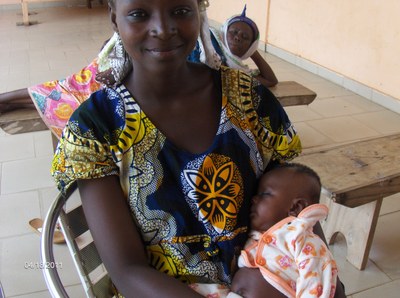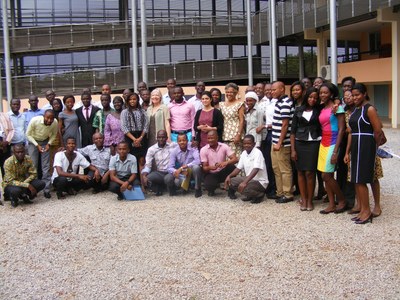SPHIS Home » News » Culture and Public Health: An Experience in Ghana
Culture and Public Health: An Experience in Ghana
Interview with one of the four wives of a chief in Northern Ghana
Contributor: Maryam Ahmed, MPH, Alumna '14
In a typical academic institution, a student is taught various concepts, ideas, models, frameworks, and more. The environment in which the student learns is composed of relatively like-minded peers and the social atmosphere remains similar throughout the academic year. The problem solving skills and solutions are more or less relevant to the surroundings in which they are taught. As the world continues to move towards globalization, it is becoming more crucial to have a multicultural perspective and a multidisciplinary approach to developing solutions. Travel opportunities combined with an educational agenda serve as an effective way for students to gain a broader outlook. It provides a first-hand account of diverse people, cultures and the complex factors as well as constructs that influence different worldviews.
As current and future public health professionals, I think it is valuable to understand and be able to relate to people of diverse cultural backgrounds. Like me, most who are involved in public health initiatives are interested in making a difference and working towards promoting health for all. The field calls for interactions with populations that are comprised of different cultures and subcultures. What better way is there to learn about health systems and become informed about cultural variations and its beauty than to set out on an educational journey across the world?
Every year, the University of Louisville’s School of Public Health and Information Sciences (SPHIS) offers students a rewarding opportunity to travel to Ghana and develop individual and/or team research projects. The objective of academic travel organized by institutions is to facilitate a learning opportunity that will allow students to broaden, build on, and apply the skills gained from classrooms. This year, I decided to join faculty members and one other student on an adventure in hopes of gaining a better understanding of public health issues as well as access to and utilization of health care in Ghana.
Briefly, Ghana is located in the West Coast of the Sub-Saharan region of Africa. It is surrounded by neighboring countries Côte d’Ivoire [Ivory Coast] (West), Togo (East), and Burkina Faso (North). The country is rich in culture with dozens of languages, ancient kingdoms and empires, and diverse ethnic groups. It is commonly known as the first Sub-Saharan African nation to gain independence from Western rule and also has historical significance in terms of the trans-Atlantic slave trade. Though the economy is developing, the country ensures free healthcare to children under the age of 18 and pregnant women. Over 40 percent of the population is covered and exempt from paying health insurance premiums. Many of the leading causes of death are preventable and the number one cause of death is malaria. The nation recognizes these issues and has developed a common goal to improve health outcomes and reduce mortality rates among women and children.  My goal for the trip was to conduct an interview with three women who are in a polygamous marriage with a chief, an influential and community leader recognized as keeper of traditional law and customs. My research interest was to explore social, cultural, and psychological components of the extended family, which is a common family group in Africa and many underdeveloped countries. In doing so, I hoped to understand the extent to which it had an impact on mental health. I also worked on a team project to analyze data that was collected in the previous year by local staff at the Tamale Teaching Hospital in the Northern region of Ghana and students from the SPHIS during their visit. The data were collected as part of a collaborative research effort aimed to describe personal and institutional barriers to access health care. We presented our findings along with recommendations to local hospital staff to assist the hospital in developing patient-centered care procedures.
My goal for the trip was to conduct an interview with three women who are in a polygamous marriage with a chief, an influential and community leader recognized as keeper of traditional law and customs. My research interest was to explore social, cultural, and psychological components of the extended family, which is a common family group in Africa and many underdeveloped countries. In doing so, I hoped to understand the extent to which it had an impact on mental health. I also worked on a team project to analyze data that was collected in the previous year by local staff at the Tamale Teaching Hospital in the Northern region of Ghana and students from the SPHIS during their visit. The data were collected as part of a collaborative research effort aimed to describe personal and institutional barriers to access health care. We presented our findings along with recommendations to local hospital staff to assist the hospital in developing patient-centered care procedures.
Our journey started in Accra, the capital of Ghana. We were welcomed and introduced to the country by a local tour guide who was also an exceptional storyteller. Our guide shared the country’s history, traditions, political and social structure, religion, and culture throughout the first week. Every moment comprised of invaluable lessons ---whether it was about cultural customs and norms or historical events. The team and I traveled to various regions of the country to gain a comprehensive and holistic perspective. As a part of our itinerary, we visited historical centers, museums, and cultural and traditional sites. We toured administrative offices, art and crafts producing villages, a National Park and the Aburi Botanical Gardens. We also shopped at markets and experienced a daylong traditional Ashanti funeral.
As a team, we spent majority of our time in the city of Tamale, conducting our individual and group projects. Our group leader, Dr. Muriel Harris, provided training on research methods and approaches. As a part of the training, the groups were assigned teamwork. This allowed for an exchange of important information among those who participated in the sessions. The experience led us to discover local health issues that differed from those we discuss here in the US. It also led us to identify key health issues, explore appropriate ways to address the challenges involved, and also gain insight on the complexity of the issues. Short conversations with health professionals (also in the country working with hospitals to improve health conditions) revealed that implementing procedures to increase simple behavioral practices such as washing hands were proven to make a difference. Such discussions and others pertaining to finding solutions to address preventable health risks helped me realize just how much public health is taken for granted.  During our trip, we gradually gained an expanded view of what health and wellness looks like in other parts of the world, and in particular Ghana. We were able to expand our knowledge and awareness of structural barriers to health for populations impacted by poor economic conditions. Personally, I was able to gain a better understanding of the interconnectedness of health, economic development, politics, culture, social justice, and environment.
During our trip, we gradually gained an expanded view of what health and wellness looks like in other parts of the world, and in particular Ghana. We were able to expand our knowledge and awareness of structural barriers to health for populations impacted by poor economic conditions. Personally, I was able to gain a better understanding of the interconnectedness of health, economic development, politics, culture, social justice, and environment.
Traveling truly is a life-changing and transformative experience that enables the traveler to go out of his/her comfort zone to uncover diverse cultures, knowledge, and one’s connection to others. Most of my personal growth is owed to the experiences I have had during my travels abroad and they will stick with me forever. My three-week stay in Ghana broadened my worldview in many ways and will ultimately help me better serve the communities I will work with. I am grateful for the opportunity.






